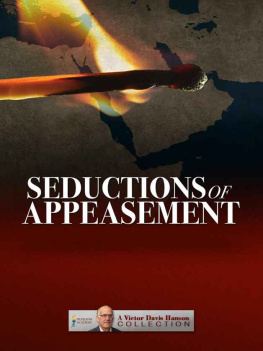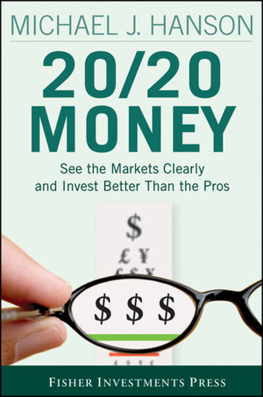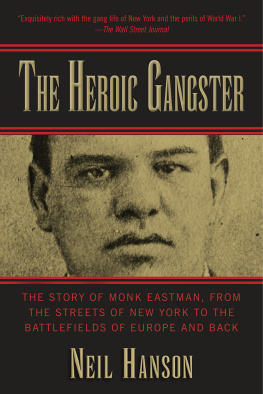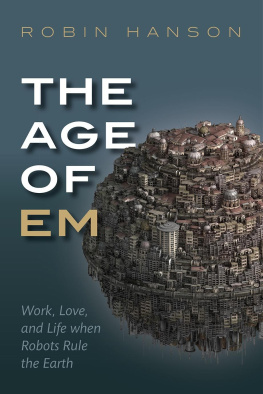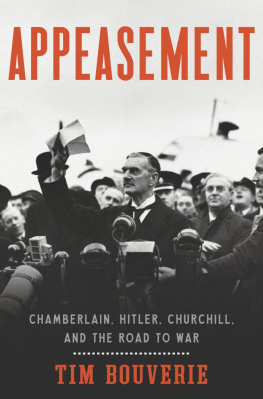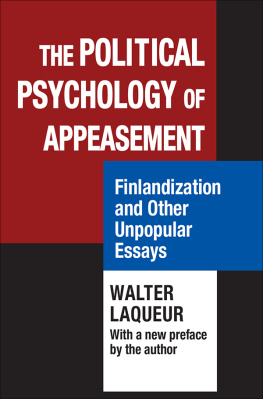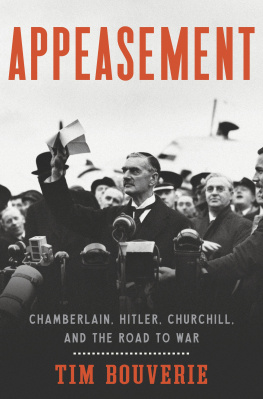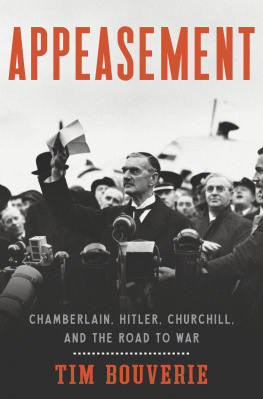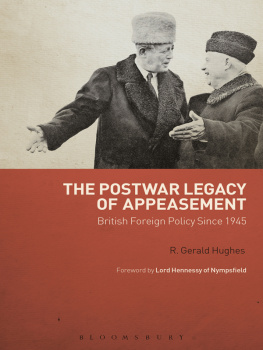Seductions of Appeasement
by
Victor Davis Hanson
Copyright 2015 by Freedom Academy.
www.FreedomAcademy.com
All rights reserved. No part of this publication may be reproduced, stored in a retrieval system, or transmitted, in any form or by any means, electronic, mechanical, photocopying, recording, or otherwise, without the prior permission of Freedom Academy.
ISBN # 978-1-940331-30-0
You are reading a Freedom Academy E-Book offered by PJ Media, LLC
Like what youre reading? Find more at the PJ Store, where you can explore e-books and videos from the Freedom Academy authors you know and trust. As a welcome gift, wed like to extend two special offers to readers of Seductions of Appeasement :
Click here for 15% off any item in the PJ Store.
Due to your interest in Seductions of Appeasement , we thought you might like PJTVs World War II documentary series, narrated by Victor Davis Hanson.
Click here to watch the first part, The Causes of WWII, free!
Check Out These Other E-Books from Freedom Academy:
Surviving the End: A Practical Guide for Everyday Americans in the Age of Terror by James Jay Carafano, Ph.D.
Crimes Against the Republic by J. Christian Adams
Homeschooling: Fighting for My Childrens Future by PJ Media contributors
Forward
There is nothing new under the sun, Ecclesiastes teaches. When some alleged innovation is urged on us, we should bring historys judgment to bear; inevitably, the ages before us have left precedent to draw upon. Yet, the preacher also laments, There is no remembrance of former things. The human tendency is, as current fashion puts it, to live in the moment.
Fortunately, we have Victor Davis Hanson to defy the last bit of that ancient wisdom, even as he demonstrates the vitality of history.
In this collection of recent essays from Works and Days , Professor Hansons PJ Media column, the renowned historian and classicist explores a schizophrenic American landscape: a public dimly enough attuned to our exceptional traditions to fulminate over the ingratitude of Muslim nations after our enormous sacrifice of blood and treasure; yet plagued by self-doubt thanks to relentless America-bashing by our own elites. Paralyzed, we prefer half-baked therapy to an honest, rational assessment of the real and rising dangers posed by violent jihadists and hostile regimes. We not only elect but reelect a therapist-in-chief determined to force on the world pieties as unworkable as they are unshakable, born of a preference for ideological abstraction over empirical knowledge.
The result is Barack Obamas doctrinaire appeasement, along with its twin, multiculturalism. Appeasement, Hanson explains, is the supposedly wise policy of understanding an enemys predicaments, the theory that an aggressor will be mollified rather than emboldened by concessions our leaders so carefully calibratei.e., so delusionally rationalize. It is the anti-historical fantasy that threats will be averted, not exacerbated, by eschewing confrontation while an aggressor grows stronger and more audacious.
Multiculturalism, which Hanson fittingly describes as a global neurosis, is actually a nonsense word. Far from the worthy Western study of various cultures, it is a therapeutic exercise of exaggerating Western sins while ignoring non-Western pathologies to attract those who see themselves as not part of the dominant culture. In our time, it is the indefatigable self-loathing that sees Islamist aggression, forcible and cultural, as comeuppance for American imperialism; it is studiously blind to the age-old Middle East pathologiesmisogyny, religious intolerance, tribalism, fundamentalism, anti-Semitism, and statism.
The twin concepts of appeasement and multiculturalism are tied to each other, and to President Obama, by their innate narcissism and ultimate illiberalism. The Obama paradigm says that outreach to and dialogue with our enemies is always more enlightened and preferable to the expense and burdens of military preparedness and deterrence. It holds that without acknowledging radical Islams existence, it can be quelled by euphemism and the purging of language. Thus are jihadist attacks airbrushed as workplace violence, violent extremism, and man-caused disasters to be addressed by overseas contingency operations. Meanwhile, restrictions are placed on the utterance of jihadist, Islamist, and even terror. Somehow, the phenomenon of Islamist aggression will simply melt away.
The disaster Obamas approach has wrought is manifest. After years of indulging Islamists at the expense of erstwhile American allies, al-Qaeda is not merely ascendant but superseded by the Islamic State, which has redrawn the map of the Middle East. Futile negotiations have left Iran on the cusp of becoming a nuclear power, with international legitimacy, even as it continues sponsoring terror and reaffirms calls for Israels destruction and death to America. The Russian reset has emboldened Vladimir Putin to seize the Crimea and Eastern Ukraine, and to contemplate a conquest of the Balticsmaking a final mockery of NATO. The Asian Pivot quickly deteriorated into a ceding of regional influence to China, a downplaying of the rogue North Korean nuclear state, and the schooling of Americas Pacific allies in the Obama 101 lesson all too familiar to Israel and Americas other Middle Eastern allies: Theyll need either to make their own defense arrangements or prepare to grovel to the new hegemon eagerly filling the void left by American retrenchment.
With searing historical illustrations, Hanson shows there is nothing novel in Obamas approach, or in where it leads. It is Chamberlain at Munich; Acheson vowing to war-weary America that the Truman administration would not extend defense obligations to the Korean Peninsula; Britain withdrawing its only small warship from the Falkland Islands as a gesture of reconciliation to Argentina; George H.W. Bushs ambassador assuring Saddam Hussein that the United States took no position on Iraqs border dispute with Kuwait. It is FDR lecturing Churchill that he alone had the skills to win over Stalin; or Jimmy Carter convinced that his unique understanding of Moscow, Central American communists, Palestinian terrorists, and Iranian theocracy would yield lasting peace rather than global chaos.
For Carter from the left, as for Chamberlain from the right, appeasement was a wayward tactic in a search for real peace. In grim contrast, Obamas idea of peace seems to be Nazi-dominated Europe circa 1941with war over thanks to serial surrenders. The president has reversed Sullas ancient axiom that other peoples would find in Rome no better friend, no worse enemy. The result is the likelihood that a nuclear Iran triggers a Middle East war unlike any of the last 70 years; the prospect that NATO membership makes a small country more rather than less vulnerable to Russian aggressionthe way Czechoslovakia and Polands alliances with France and Britain made them more enticing targets for Hitler; and the United Statesstill vulnerable to domestic jihadist strikes, and crushed by its $18 trillion debtdeclining in the manner of a broke, tired, and socializing Britain, ceding its global role except with no America poised to take its place.
The grounds for pessimism are not relentless. To the contrary, Hanson marshals our impressive assets: fossil fuel expansion and increasing energy security, universities that dominate global rankings, armed forces still far stronger than the next dozen national militaries combined, workers still many times more productive than their nearest competitors, even amid economic doldrums. Americas greatness can survive Obama but only by remembering former thingsin the words of Victor Davis Hanson, only by the wisdom of reacting to and doing the opposite of what the Obama era has wrought.
Andrew C. McCarthy
Next page
